#Mittie Roosevelt
Text
The Loves of Theodore Roosevelt by Edward F. O'Keefe #BookReview #NetGalley #ARCReview #Biography #Presidents
A forthcoming book on Theodore Roosevelt examines the influence of five women in his life and how they helped shape his presidency. #BookReview #ARCReview #womenshistory #presidentialhistory #NewBooks #SimonandSchuster #TheodoreRoosevelt #AliceRoosevelt
A spirited and poignant family love story, revealing how an icon of rugged American masculinity was profoundly shaped by the women in his life, especially his mother, sisters, and wives.
Theodore Roosevelt wrote in his senior thesis for Harvard in 1880 that women ought to be paid equal to men and have the option of keeping their maiden names upon marriage. It’s little surprise he’d be a…
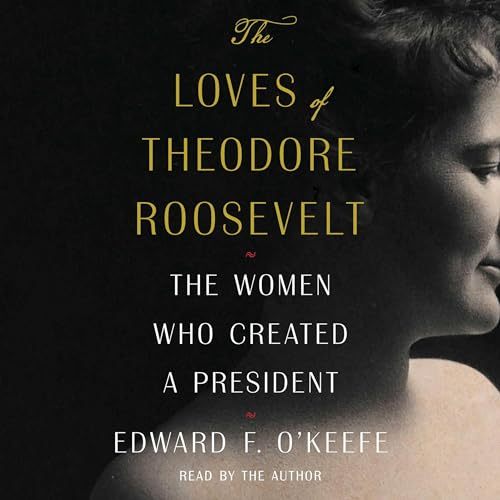
View On WordPress
#2024 Books#Alice Hathaway Lee#Alice Roosevelt#ARC Review#Book Review#Edith Roosevelt#May 2024 Books#Mittie Roosevelt#NetGalley#New Books#Presidential History#Simon & Schuster#Teddy Roosevelt#Theodore Roosevelt#U.S. Presidents
0 notes
Text
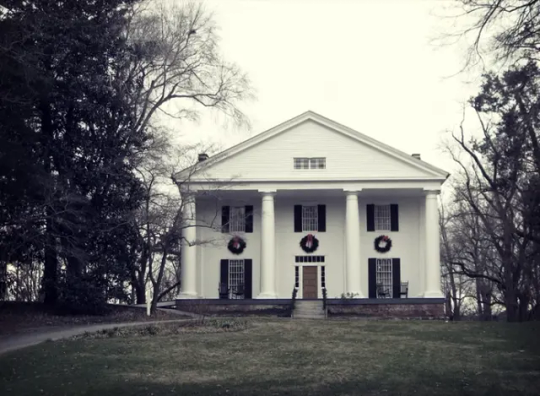
Bulloch Hall
Roswell, Georgia
In Roswell, north of Atlanta, is a former plantation home that may look familiar if you’ve seen Gone with the Wind. The large, four-column portico entrance may have inspired Margaret Mitchell’s fictional Tara Plantation. Bulloch Hall is home to Teddy Roosevelt’s mother Mittie Bulloch, as well as myriad other who lived, suffered and died there. Some talk of the ghost of a slave girl, who is said to move from room to room, turning off the lights. Other visitors have seen the specters of those dressed in antebellum garb or Confederate gray, who vanish into thin air. Mittie, who was a voracious reader, is said to sill sit in her favorite chair in the library, which rocks back and forth, though there’s no one there.
#Bulloch Hall#haunted houses#ghost and hauntings#paranormal#ghost and spirits#haunted locations#haunted salem#myhauntedsalem#paranormal phenomena#ghosts#haunting#haunt#ghostcore#supernatural#hauntings#spirits
5 notes
·
View notes
Text
A Horrible, Life Altering Valentine
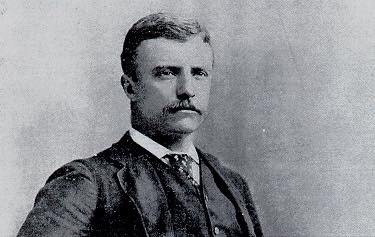
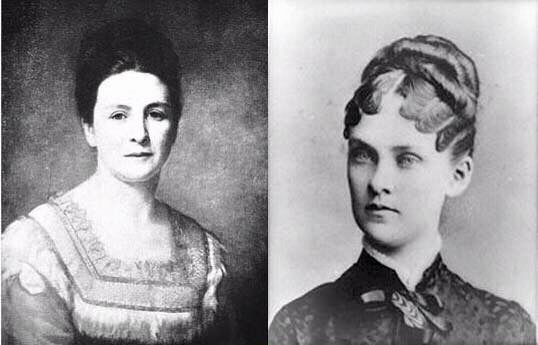
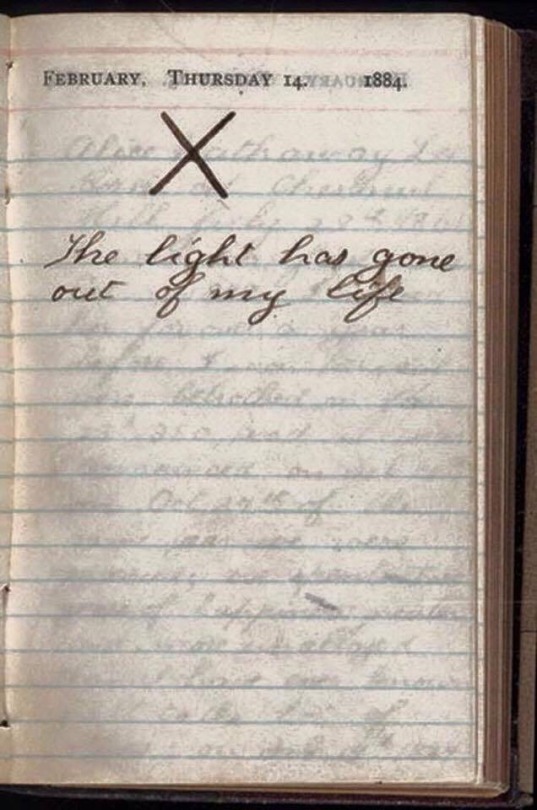
Today in History, February 14: 1884:
25 year old Theodore Roosevelt was at work in the New York Assembly in Albany fighting for a reform bill when he received an urgent telegram to return to his home in New York.
When he reached his front door his brother Elliott greeted him, “There is a curse on this house”.
Their mother Mittie was suffering from Typhoid fever, and Teddy’s wife Alice, who had…
View On WordPress
#1884#Alice Lee Roosevelt#February 14#History#mark loves history#Mittie Roosevelt#Theodore Roosevelt#this date in history#This Day in History#today in history#Valentines day
0 notes
Text
@luckylucianodoesntlikeonions you wanted more weird stories from my town but the post was getting rlly long so i made new post
My next door neighbor got arrested for sex trafficking. I didnt even know i had a next door neighbor until the police were breaking his door down
Once a crackhead ran on my schools campus and tried to attack the cross country team
Once a kid dressed like stalin and administration did nothing about it
Ap teachers regularly say fuck
We have a homeless guy living here that is actually called crazy steve. Unfortunately no he does not look like jerry trainer
Theres a person at my school who looks exactly like me from behind. Same hair. Same style. We always happen to wear denim jackets at the same time. The thing is that hes a dude and im a girl. We have been mistaken for eachother multiple times
Theres this one asian girl in my class who became the president of the anime club bc everyone thought she was japanese. She even went by a japanese name. Come to find out her name is katelyn. (doesnt sound that weird but it felt like i was being told some cursed information) she transferred out of our class after that.
My freshman year they were doing a experiment where on every Wednesday and Thursday all upperclassmen were allowed to do anything they wanted on campus as long as it wasnt against school policy. The school was broken into blocks so hundreds of students would walk around the same block for hours. It was called the lazy river. Everyone who participated doesnt remember why they did. Nobody knows who started it.
despite living in a swamp ive never been bitten by a mosquito
Time seems to pass really weirdly here. Like its not consistent
Nobody can remember my age or gender. I feel like im turning into a cryptid
We have goats at my school and almost nobody knows
A teacher dressed in drag for the school musical and thats all i cant think of when i see him
My friend is 6'6 and im 5'2 ive been told that im more intimidating
The fuck ya chicken strips guy lived here
A famous alternative band started here too
My math teacher is the kind of person that seems like she doesnt go home. She just does math thats it. She has calculator magazines
Everyone has really weird ass dreams
My friend had a dream that he, an atheist, worked in and underground church. He gave a sermon that included "i have fornicated on stolen antique furniture"
The french teacher hid a kitten in her class for 3 weeks
I work in guidance and theres always a radio softly playing and it plays loud enough to hear but not enough to make it out. I cant find the source of it. It doesnt get louder or softer when you move around.
And now im gonna include all the shit from my cryptic history teacher last year
He had heart faliure a couple years ago. The first thing he said to us was "ive already died you cant put me through any worse"
Every time he mildly irritated me i would tell him "one swift blow to the chest and ill take you out"
He almost got shot for insulting the former leader of the soviet union
He has a picture of every modern president as a baby in a dress
He has a cardboard cutout of elvis in his class
He lived in a meth house with a goat named groover
He almost named his son after teddy roosevelt
I had him twice a day so the first day of school he said "we can start fundraising for your therapy bills now because youre going to need it"
He can do a really good bill clinton impression
I think he called me a whore once
He insisted on calling nixon tricky dick
He has threatened to fist fight me
He has also threatened to throw me
He flipped off all the light in the room and went "hey guys check this out" and turned on his light up christmas sweater
He said teddy Roosevelt has big stick energy when we were talking about how he ran around naked washington dc
Every time i questioned him he would scream "WHAT ARE YOU THE POLICE?"
He dedicated an entire day to learning about acid jesus
He let me keep a 2 ft tall stuffed flamingo in his class all day and didnt question me
He has really pointy elbows
His favorite band is wheezer
@tiity-mitty feel free to add more if you want
30 notes
·
View notes
Text
Films I recommend!
Just some films that I’ve decided to recommend after watching one of them today!
~~
The Secret Life of Walter Mitty- This film has amazing cinematography and transitions, it’s story is excellent and the acting is on point! In a nutshell it’s about a man named Walter Mitty who works for Life magazine (like Time magazine) developing the cover photos. He daydreams since his life is boring but once the company goes under new management and goes online, Walter must go on a trip to try and find the requirements negative for the last cover photo. Five stars. Always up for some Ben Stiller!

The Equalizer 2- I know this is a sequel but, in my opinion, you don’t need to know too much about the first one. I don’t know too much about it but I still love this movie. Denzel Washington plays an ex-assassin, now uber-type driver, lives in Massachusetts and tries to help the people around him while he’s being hunted by of the people who killed his friend. I probably can’t explain too well but he helps reunite a family, guide a teen to his ideal career and helps countless people along the way. Five stars. Again, always up for a watch. (There aren’t too many gifs for this so here you go)
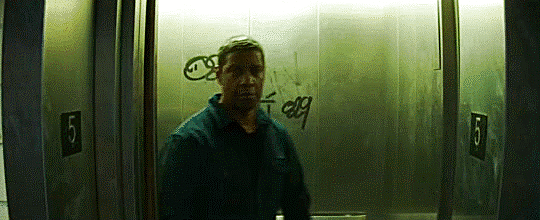
Night at the Museum (Series)- The fandom for this is still active and I write fanfic on it! Unfortunately no more movies can be made without a serious change because Robin Williams played a main character in it so... Anyway, the plot of the films are that Larry Daley (Ben Stiller) is a divorcé with a son who he shares split custody of, he gets a job at the Natural History Museum in New York as the night guard but he finds out that the tablet of the the (fictional) Ancient Egyptian Pharaoh Ahkmenrah (Rami Malek) brings all the exhibits to life. Every one of the 3 films has an amazing plot and characters, they talk about issues properly and the humour is amazing. Robin Williams is Teddy Roosevelt for crying out loud! Four/Five Stars just because it’s sad that there won’t be anymore films but I highly recommend them
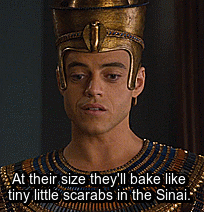
~~
That’s all for now, might do some more so here we go!
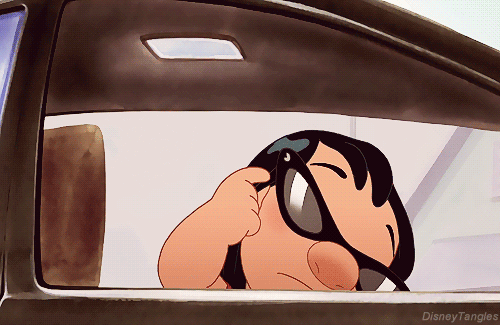
#bear writes#film recommendation#film review#the secret life of walter mitty#the equalizer#the equalizer 2#natm#night at the museum#natm 2#natm 3
14 notes
·
View notes
Text
on to the finish line! The Alienist, 1x09 and 1x10
I really, really don’t like that Mary was killed. I think it’s fair to call this fridging - Mary’s death is primarily significant because Laszlo loves(/d) her - she didn’t really have an onscreen arc of her own - although the show certainly implies she’s had quite a journey to become the woman she is.
That being said, I appreciate that the scene at her funeral features Stevie and Cyrus, who were members of her household and her friends, and that John reads at the interment. It’s not much, but at least the show makes and effort to be clear she was a beloved member of a community, no matter how small. The character deserved better, but I’ve seen much worse.
Also, because this show really wanted to hurt me, Theodore Roosevelt, in offering his sympathies to Laszlo, tells him “Please forgive me for offering the same advice you once gave me. You are not alone in your sorrow, and there’s no shame in grieving for those you love.” Presumably Laszlo told him that in February of 1884, when Alice Hathaway Lee Roosevelt, his first wife, died hours after Roosevelt’s mother, Mittie Bullock Roosevelt (on February 14th, too). I appreciate the validation: that Mary was just as important to Laszlo as Alice had been to TR. Doesn’t help with the fridging, but it lends narrative weight to Mary’s short arc.
(also, Laszlo kissing the earth her throws on Mary’s coffin is a new standard of pain for me.)
honestly, Lucius should have let Marcus bash Doyle’s skull in. how many slurs can a man fit into a two minute interrogation? jesus. forget van Bergen, Doyle and Connor make me want to scrub until my skin comes off.
The short scene between Stevie and Cyrus after Mary’s funeral is the most important scene. Stevie, scrubbing dishes, taking up the space that Mary should be in, crying and swearing he’s going to get Connor? Cyrus nonchalantly sharpening a pocketknife and telling Stevie that he doesn’t have to cut a man’s throat to kill him, he just needs to nick a vein? again, they were Mary’s friends and surrogate family. Their grief, especially as those who have been wronged by society and the police/criminal justice system in the past, is important.
I genuinely was not expecting that, that the murderer had been an enumerator.
it’s always cats. Seriously, this show talked about the connection between cruelty to animals and cruelty towards humans - kill animals as an early warning sign? - but I, personally, would have loved a digression on the connection in between reformers trying to eliminate cruelty to children and cruelty to animals in the late 19th century.
WILL SOMEONE PLEASE SHOOT CONNOR
god, Cyrus, you were so close.
for once, this refrain of “jfc, Laszlo” is brought to you not by Laszlo being a dick to Sara or John or Mary, but because of him getting drunk, monologuing @ his dead father in German, and stabbing himself in the bad arm what the hell
EW EW EW EW EW EW EW
Theodore Roosevelt: Moment Killer. c’mon, let Sara and John have an actual conversation and heart-to-heart already.
oh, man. This conversation between Sara and Laszlo was heavy, hurt, and was a really, really long time coming. I’m glad Laszlo finally apologized for hitting her, and meant it - he’s been cavalier with the harm he’s done others. And ... jesus. What an admission from Sara. It’s understandable, just knowing that her father died by suicide, that her father is a sore subject and that the lessons he taught her are so sacred. But that he’d tried and failed, and - at 12 years old! - she’d helped him kill himself because he asked? I paused the episode and just put my head in my hands. And thank Christ Laszlo acted like her friend, finally, and not the titular alienist. ~Growth~
(I’m less surprised by Laszlo’s own admission - that his father broke his arm so badly as a child it never healed properly - though, again, it’s a sincerely painful moment, but two things? it’s been hinted at since episode six, and, coming on the heels of Sara’s confession, it feels less like a narrative blow and more like a blood-letting: a clearing of the air, an apology, a pact.)
The fellowship has been reassembled!
“I’m not the least bit frightened by these ... psychopaths.” John’s grandmother (Mrs. Moore?) is an icon, I tell you.
well, the murderer is Private Starks. That’s something? I’m always glad to see my Mercy Street folks popping up elsewhere but, wow, this is going to kill my ability to watch 1x05 and 1x06, now.
awww, if it isn’t one of my favorite tropes: bidding farewell to loved ones before going into danger. Marcus Isaacson AND Teddy R.
we take the moment to put the plot on hold in order to reveal that John’s fiance didn’t just dump him, Julia Pratt left him to pursue a relationship with John Jacob Astor IV! DAMN.
Laszlo really had to wait until the last scene of the opera, when Don Giovanni gets dragged to Hell, in order to make a break for it?! thematically appropriate and solidifying his position as the most dramatic.
ohhhhhh, man. this whole sequence makes me so claustrophobic I’m itching. maybe that’s the wrong word? The atmosphere is so oppressive, the darkness pushing in on all sides, the water steadily dripping? Well done, show.
... I honestly expected Laszlo to be angrier, more upset? when Connor confronts him. They all know Connor killed Mary. But bravo, Sara, for killing Connor. Finally.
Roosevelt telling Sara her father would have been proud of her is such a bittersweet moment!
HE HAD A RING FOR MARY IM NOT OKAY on the one hand, Laszlo, you only managed to ask her to have dinner with you one (1) time! but also rather in character for him, all told, that he’d have gotten that far ahead of himself but at the end of the day, I repeat, I am not okay with this information.
Honestly, John staring at Sara with hearts in his eyes? hard same.
“I still believe we can be better than nature intended.” bold words for someone who’s just been through nearly a half year of Hell. Proud of you, Laszlo.
So that’s it! This has been ... quite a ride. I think it’s pretty clear this show’s the product of the 90s - when the book was written - its concerns about the origins of serial killers & the development of forensic science, and, honestly, how it deals with women and people of color. It did have some of the Good Stuff re: social commentary and critiques of power and especially police forces. I stand by my observation - that some of the dialogue and plotting was clunky, and, looking back on the episodes, it dragged a little bit in the middle for me. I’m curious about how the book stacks up, tbh. All in all, not bad for something I watched almost entirely for the costume and set design (and Daniel Bruhl). Will watch again?
2 notes
·
View notes
Photo

One evening in March 1881, as they sat in Mittie’s room, they talked about their own lives and ambitions. Bamie said she would have preferred to live in “more stirring times,” when strong women had real power. [Her sister] Corinne wrote to her fiance, Douglas Robinson, about that evening: “What a splendid queen she would have made...With you and Teddy as prime ministers and Elliott as master of ceremonies, [Bamie] might have ruled the world!”
[Her nieces] Eleanor Roosevelt and TR’s daughter Alice were particularly inspired by Bamie. Both agreed that she would have been president had she been a man.
Denied a position of public power, however, Bamie nevertheless had a great influence on the political life of the country while her brother Theodore was president.
Blanche Wiesen Cook on Anna “Bamie” Roosevelt Cowles in Eleanor Roosevelt: Volume One, 1894-1933
#bamie roosevelt#roosevelt#theodore roosevelt#women in history#american history#maybe Bamie Roosevelt would've made a great president but thank GOD we got her brother at least!#apparently she and Eleanor later had a falling out which is sad because Eleanor was exactly the type of woman I think herself wished to be#also SO MANY ROOSEVELTS
10 notes
·
View notes
Text
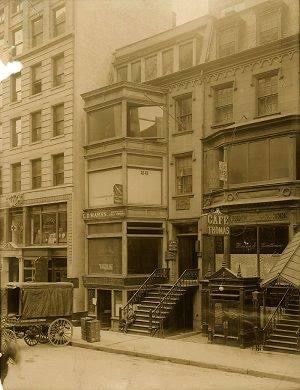
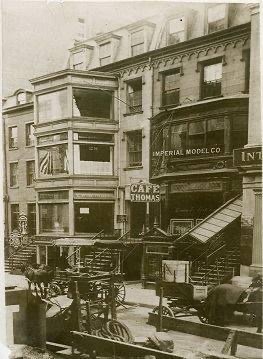
1896 28 East 20th St, home of Teddy Roosevelt. (1865 sketch image in comments, along with an additional image.
Images and Narrative are from the National Park Service.
Theodore Roosevelt's grandfather, Cornelius Van Schaack Roosevelt(CVS) grew very wealthy from his successful plate glass importing business, Roosevelt and Son, located on Maiden Lane. In the 1830s, he moved his family uptown to Union Square and built a mansion at Broadway on a property which extended from 13th to 14th Street. This followed the trend of other prominent New Yorkers, who pushed northward and established themselves in fashionable residential areas at what was then the outskirts of the growing city.
CVS was so wealthy that he purchased houses as wedding presents for each of his five sons when they married. He gifted two neighboring brownstone townhouses on East 20th Street as wedding presents to his two youngest sons. In 1854, Theodore, Sr.and his wife "Mittie" moved into No. 28, where the future president Theodore Roosevelt was born. Right next door at No. 26 lived Theodore uncle Robert Barnwell with his wife "Lizzie" Ellis.
The Brownstone Townhouse of Theodore Roosevelt
A sketch of the original brownstone of Theodore Roosevelt's family, circa 1865
This sketch shows a portrayal of 20th Street as it looked around 1865. To the right stand the original brownstone of Theodore Roosevelt and the home of his uncle Robert next door. (comment image)
Theodore Roosevelt's grandfather, Cornelius Van Schaack Roosevelt(CVS) grew very wealthy from his successful plate glass importing business, Roosevelt and Son, located on Maiden Lane. In the 1830s, he moved his family uptown to Union Square and built a mansion at Broadway on a property which extended from 13th to 14th Street. This followed the trend of other prominent New Yorkers, who pushed northward and established themselves in fashionable residential areas at what was then the outskirts of the growing city.
CVS was so wealthy that he purchased houses as wedding presents for each of his five sons when they married. He gifted two neighboring brownstone townhouses on East 20th Street as wedding presents to his two youngest sons. In 1854, Theodore, Sr.and his wife "Mittie" moved into No. 28, where the future president Theodore Roosevelt was born. Right next door at No. 26 lived Theodore uncle Robert Barnwell with his wife "Lizzie" Ellis.
26 and 28 East 20th Street circa 1900
The homes of TR's family and the neighboring home of uncle Robert has been converted into stores with bay windows. Busy commerce has replaced quiet residences.
The "brownstones" which lined the neighborhood of the wealthy referred to both the prized architectural style and building material. The Romantic movement of the early to mid-1800s, expressed by Henry Thoreau, Ralph Waldo Emerson and Walt Whitman, advocated a return to nature in architecture where buildings would copy nature. Brownstone, or brownsandstone, was found suitable, with its warm color and ease of carving. Its availability in Ohio, New York, Pennsylvania, Connecticut, and New Jersey allowed for easy transportation via water and rail. At the same time, there was less land available as the population grew, favoring "row houses" which were attached to their neighbors, sharing common walls.
The simple exterior of brownstones clashed with the decorative interiors of the Victorian era of 1837 to 1901, although the wealthy adopted the long rows of identical houses. Some rejected this style, such as Edith Wharton, a contemporary of TR, who lived not far from No. 28 in a similar brownstone in Gramercy Park. Wharton expresses in Age of Innocence her skepticism of the uniformity of New York society in its architecture. The layouts of brownstones followed a pattern. They had a tall stoop which led to a front door that opened on the second floor into a long narrow hall, with a parlor in the front and a dining room at the rear, the bedrooms upstairs, and the kitchens and servant quarters in the ground floor basement, which had its own servants' entrance. The brownstone of Theodore Roosevelt's family had this layout.
By the late 1800s, brownstones were going out of fashion and a commercial tide arrived in the neighborhood of the Roosevelt family. In 1873, following the continual trend of northward migration, Theodore Sr. moved his family to a mansion at No. 6 West 57th Street, just below Central Park and next door to Theodore Roosevelt's uncle James.Theodore was fourteen years old. The brownstone where Theodore Roosevelt was born on 20th St. was sold. At first, bay windows were added to the five-story brownstone when it became a store in 1896; it was then completely demolished to make way for a two-story retail structure in 1916.
Three years later, Theodore Roosevelt died and his family bought the store and the uncle's original brownstone next door. They rebuilt the sites into a replica of Theodore Roosevelt's birthplace circa 1865, with five period rooms, two exhibit galleries, and an auditorium. It opened in 1923 as "The Roosevelt House." It was privately run by the Women's Roosevelt Memorial Association (WRMA) until 1962, when the National Park Service (NPS) turned it into a National Historic Site (NHS).
https://www.nps.gov/thrb/learn/historyculture/brownstone.htm
0 notes
Photo
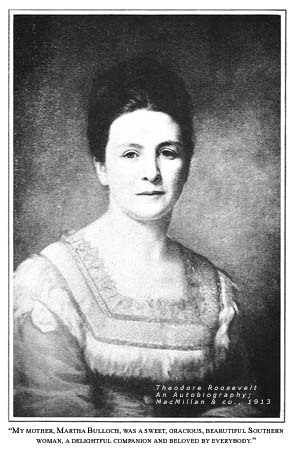
February 14, 1884: Teddy Roosevelt’s Mother Dies of Typhoid February 14, 1884:1884, Martha Bullock ("Mittie") Roosevelt, mother of Theodore Roosevelt, died of typhoid fever.
0 notes
Photo
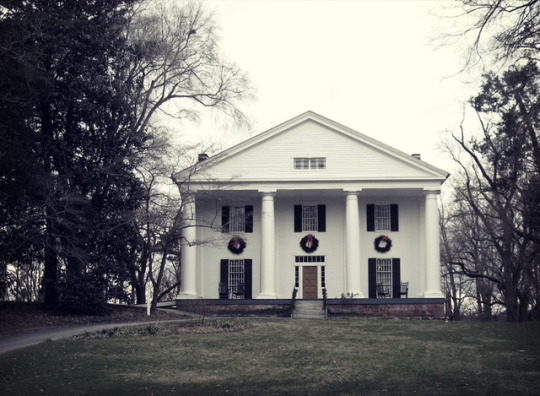
Bulloch Hall
Roswell, Georgia
In Roswell, north of Atlanta, is a former plantation home that may look familiar if you’ve seen Gone with the Wind. The large, four-column portico entrance may have inspired Margaret Mitchell’s fictional Tara Plantation. Bulloch Hall is home to Teddy Roosevelt’s mother Mittie Bulloch, as well as myriad other who lived, suffered and died there. Some talk of the ghost of a slave girl, who is said to move from room to room, turning off the lights. Other visitors have seen the specters of those dressed in antebellum garb or Confederate gray, who vanish into thin air. Mittie, who was a voracious reader, is said to sill sit in her favorite chair in the library, which rocks back and forth, though there’s no one there.
6 notes
·
View notes
Text
“The Light Has Gone Out Of My Life”
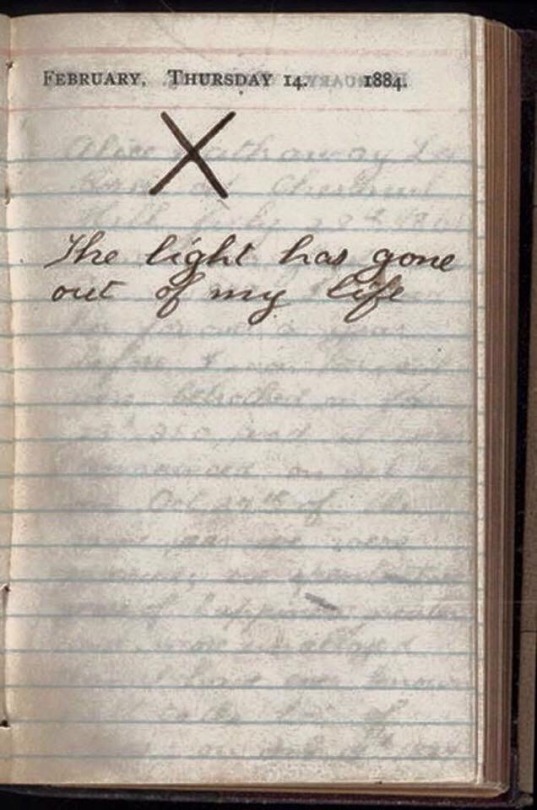
Today in History, February 14: 1884: 25 year old Theodore Roosevelt was at work in the New York Assembly in Albany fighting for a reform bill when he received an urgent telegram to return to his home in New York. When he reached his front door his brother Elliott greeted him, “There is a curse on this house”. Their mother Mittie was suffering from Typhoid fever, and Teddy’s wife Alice, who had…
View On WordPress
#1884#Alice Lee Roosevelt#February 14#History#mark loves history#Mittie Roosevelt#Theodore Roosevelt#today in history#Valentines day
0 notes
Photo
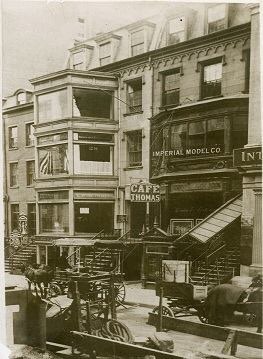
1896 28 East 20th St, home of Teddy Roosevelt. (1865 sketch image in comments, along with an additional image. Images and Narrative are from the National Park Service. Theodore Roosevelt's grandfather, Cornelius Van Schaack Roosevelt(CVS) grew very wealthy from his successful plate glass importing business, Roosevelt and Son, located on Maiden Lane. In the 1830s, he moved his family uptown to Union Square and built a mansion at Broadway on a property which extended from 13th to 14th Street. This followed the trend of other prominent New Yorkers, who pushed northward and established themselves in fashionable residential areas at what was then the outskirts of the growing city. CVS was so wealthy that he purchased houses as wedding presents for each of his five sons when they married. He gifted two neighboring brownstone townhouses on East 20th Street as wedding presents to his two youngest sons. In 1854, Theodore, Sr.and his wife "Mittie" moved into No. 28, where the future president Theodore Roosevelt was born. Right next door at No. 26 lived Theodore uncle Robert Barnwell with his wife "Lizzie" Ellis. The Brownstone Townhouse of Theodore Roosevelt A sketch of the original brownstone of Theodore Roosevelt's family, circa 1865 This sketch shows a portrayal of 20th Street as it looked around 1865. To the right stand the original brownstone of Theodore Roosevelt and the home of his uncle Robert next door. (comment image) Theodore Roosevelt's grandfather, Cornelius Van Schaack Roosevelt(CVS) grew very wealthy from his successful plate glass importing business, Roosevelt and Son, located on Maiden Lane. In the 1830s, he moved his family uptown to Union Square and built a mansion at Broadway on a property which extended from 13th to 14th Street. This followed the trend of other prominent New Yorkers, who pushed northward and established themselves in fashionable residential areas at what was then the outskirts of the growing city. CVS was so wealthy that he purchased houses as wedding presents for each of his five sons when they married. He gifted two neighboring brownstone townhouses on East 20th Street as wedding presents to his two youngest sons. In 1854, Theodore, Sr.and his wife "Mittie" moved into No. 28, where the future president Theodore Roosevelt was born. Right next door at No. 26 lived Theodore uncle Robert Barnwell with his wife "Lizzie" Ellis. 26 and 28 East 20th Street circa 1900 The homes of TR's family and the neighboring home of uncle Robert has been converted into stores with bay windows. Busy commerce has replaced quiet residences. The "brownstones" which lined the neighborhood of the wealthy referred to both the prized architectural style and building material. The Romantic movement of the early to mid-1800s, expressed by Henry Thoreau, Ralph Waldo Emerson and Walt Whitman, advocated a return to nature in architecture where buildings would copy nature. Brownstone, or brownsandstone, was found suitable, with its warm color and ease of carving. Its availability in Ohio, New York, Pennsylvania, Connecticut, and New Jersey allowed for easy transportation via water and rail. At the same time, there was less land available as the population grew, favoring "row houses" which were attached to their neighbors, sharing common walls. The simple exterior of brownstones clashed with the decorative interiors of the Victorian era of 1837 to 1901, although the wealthy adopted the long rows of identical houses. Some rejected this style, such as Edith Wharton, a contemporary of TR, who lived not far from No. 28 in a similar brownstone in Gramercy Park. Wharton expresses in Age of Innocence her skepticism of the uniformity of New York society in its architecture. The layouts of brownstones followed a pattern. They had a tall stoop which led to a front door that opened on the second floor into a long narrow hall, with a parlor in the front and a dining room at the rear, the bedrooms upstairs, and the kitchens and servant quarters in the ground floor basement, which had its own servants' entrance. The brownstone of Theodore Roosevelt's family had this layout. By the late 1800s, brownstones were going out of fashion and a commercial tide arrived in the neighborhood of the Roosevelt family. In 1873, following the continual trend of northward migration, Theodore Sr. moved his family to a mansion at No. 6 West 57th Street, just below Central Park and next door to Theodore Roosevelt's uncle James.Theodore was fourteen years old. The brownstone where Theodore Roosevelt was born on 20th St. was sold. At first, bay windows were added to the five-story brownstone when it became a store in 1896; it was then completely demolished to make way for a two-story retail structure in 1916. Three years later, Theodore Roosevelt died and his family bought the store and the uncle's original brownstone next door. They rebuilt the sites into a replica of Theodore Roosevelt's birthplace circa 1865, with five period rooms, two exhibit galleries, and an auditorium. It opened in 1923 as "The Roosevelt House." It was privately run by the Women's Roosevelt Memorial Association (WRMA) until 1962, when the National Park Service (NPS) turned it into a National Historic Site (NHS). https://www.nps.gov/thrb/learn/historyculture/brownstone.htm
4 notes
·
View notes
Text
[External Site] Files on BBD website with password from Jeremy’s Emails
Entering the password from Jeremy’s most recent email on the BBD site loads the following text on the site.
Login Complete
***** WARNING *****
***** WARNING *****
***** WARNING *****
This is a restricted government server.
Access is governed by the National Security Act of 1947, Access to Classified Information, Sections 801 - 804.
Any and all unauthorized access will be prosecuted to the fullest extent of the law.
File Status
P-63_PH-NR_SRVL.GIF Offline
D-66_TR-WE_COMMS.PDF Available [link]
D-67_TR-WE_COMMS.PDF Available [link]
474&%!#<corrupted> Offline
D-68_TR-WE_COMMS.PDF Available [link]
218%@#<corrupted> Offline
D-69_TR-WE_COMMS.PDF Available [link]
D-70_TR-WE_COMMS.PDF Available [link]
A-73_JB_PHN.WAV Offline
I-76_AS-NP.GIF Offline
The available PDF’s are transcribed under the read more. They are all typewritten letters that are hand-signed.
D-66_TR-WE_COMMS.PDF
1883
Wyatt Earp, General
Delivery, Silverton,
Colorado
Mr. Roosevelt,
It was, as always, a joy seeing you these past few days in Hunter Hot Springs. I know you have a keen interest in the West and I can assure you there is much to see here.
If you are ever in my neighborhood again, please take time to call on me.
Your friend,
Wyatt S. Earp
D-67_TR-WE_COMMS.PDF
1883
T. Roosevelt.
6 West 57th Street.
New York City, NY
Wyatt,
Thank you for your kind invitation to visit. I have recently acquired a ranch in the Dakotas in order to further pursue my interests in the West. I am returning to the East in the next week to tend to some domestic matters but will plan to journey Westward next month.
Your friend,
[signature] Theodore Roosevelt
T. Roosevelt
D-68_TR-WE_COMMS.PDF
1884
Wyatt Earp,
General Delivery,
Eagle City, Idaho
Theodore,
Deepest rewards and sympathy during this difficult time. I am saddened to hear of the passing of your beautiful wife Alice Lee and your mother Mittie on the same day. Even though I am out West, please do let me know if there is anything I can do to assist.
Your friend,
Wyatt S. Earp
D-69_TR-WE_COMMS.PDF
1884
T. Roosevelt.
6 West 57th Street.
New York City, NY
Wyatt,
Thank you for your kind words. Losing both of them was devastating and I fear there was something bigger at work in their deaths.
In our past conversations, you have been an adamant denier of the supernatural but I hope our friendship will lead you to have an open mind in regard to what I am about to confess. I must admit I have been dabbling the occult lately and I do think I am at fault for their deaths in some way.
I have become obsessed with these thoughts and must find a way to avenge their death.
Your friend,
[signature] Theodore Roosevelt
T. Roosevelt
D-70_TR-WE_COMMS.PDF
1833
Wyatt Earp,
General Delivery,
El Paso, Texas
Theodore,
I am certainly happy to hear of your new marriage. Many happy returns.
Hopefully this new happiness will brighten your outlook and turn you away from your thoughts on the occult.
Please send a letter next you are out West. I would like to visit with you once again.
Your friend,
Wyatt S. Earp
Originally posted on www.purgatorysd.com on 21 July 2017 between the airings of 2x06 and 2x07.
5 notes
·
View notes
Text
Nel 1880, Theodore Roosevelt (futuro 26° presidente degli Stati Uniti) sposò Alice Hathaway Lee (29 luglio 1861 – 14 febbraio 1884) di Chestnut Hill nel Massachusetts.
La moglie morì giovane, a 23 anni, a causa di insufficienza renale non diagnosticata (a quei tempi chiamata morbo di Bright), due giorni dopo la nascita della loro figlia Alice.
La sua gravidanza aveva mascherato la malattia. La madre di Theodore Roosevelt, Mittie, morì di febbre tifoide lo stesso giorno, alle 3 del mattino, circa undici ore prima, nella stessa casa.
Dopo la morte quasi simultanea di sua madre e di sua moglie, Roosevelt lasciò la figlia alle cure di sua sorella, Anna "Bamie/Bye" in New York City. Nel suo diario, scrisse una grande 'X' sulla pagina e poi, "La luce è uscita dalla mia vita”.
6 notes
·
View notes
Text
The Secret Life of Walter Mitty
“We’re going through!” The Commander’s voice was like thin ice breaking. He wore his full-dress uniform, with the heavily braided white cap pulled down rakishly over one cold gray eye. “We can’t make it, sir. It’s spoiling for a hurricane, if you ask me.” “I’m not asking you, Lieutenant Berg,” said the Commander. “Throw on the power lights! Rev her up to 8,500! We’re going through!” The pounding of the cylinders increased: ta-pocketa-pocketa-pocketa-pocketa-pocketa. The Commander stared at the ice forming on the pilot window. He walked over and twisted a row of complicated dials. “Switch on No. 8 auxiliary!” he shouted. “Switch on No. 8 auxiliary!” repeated Lieutenant Berg. “Full strength in No. 3 turret!” shouted the Commander. “Full strength in No. 3 turret!” The crew, bending to their various tasks in the huge, hurtling eight-engined Navy hydroplane, looked at each other and grinned. “The Old Man’ll get us through,” they said to one another. “The Old Man ain’t afraid of Hell!” . . .
“Not so fast! You’re driving too fast!” said Mrs. Mitty. “What are you driving so fast for?”
“Hmm?” said Walter Mitty. He looked at his wife, in the seat beside him, with shocked astonishment. She seemed grossly unfamiliar, like a strange woman who had yelled at him in a crowd. “You were up to fifty-five,” she said. “You know I don’t like to go more than forty. You were up to fifty-five.” Walter Mitty drove on toward Waterbury in silence, the roaring of the SN202 through the worst storm in twenty years of Navy flying fading in the remote, intimate airways of his mind. “You’re tensed up again,” said Mrs. Mitty. “It’s one of your days. I wish you’d let Dr. Renshaw look you over.”
Walter Mitty stopped the car in front of the building where his wife went to have her hair done. “Remember to get those overshoes while I’m having my hair done,” she said. “I don’t need overshoes,” said Mitty. She put her mirror back into her bag. “We’ve been all through that,” she said, getting out of the car. “You’re not a young man any longer.” He raced the engine a little. “Why don’t you wear your gloves? Have you lost your gloves?” Walter Mitty reached in a pocket and brought out the gloves. He put them on, but after she had turned and gone into the building and he had driven on to a red light, he took them off again. “Pick it up, brother!” snapped a cop as the light changed, and Mitty hastily pulled on his gloves and lurched ahead. He drove around the streets aimlessly for a time, and then he drove past the hospital on his way to the parking lot.
. . . “It’s the millionaire banker, Wellington McMillan,” said the pretty nurse. “Yes?” said Walter Mitty, removing his gloves slowly. “Who has the case?” “Dr. Renshaw and Dr. Benbow, but there are two specialists here, Dr. Remington from New York and Dr. Pritchard-Mitford from London. He flew over.” A door opened down a long, cool corridor and Dr. Renshaw came out. He looked distraught and haggard. “Hello, Mitty,” he said. “We’re having the devil’s own time with McMillan, the millionaire banker and close personal friend of Roosevelt. Obstreosis of the ductal tract. Tertiary. Wish you’d take a look at him.” “Glad to,” said Mitty.
In the operating room there were whispered introductions: “Dr. Remington, Dr. Mitty. Dr. Pritchard-Mitford, Dr. Mitty.” “I’ve read your book on streptothricosis,” said Pritchard-Mitford, shaking hands. “A brilliant performance, sir.” “Thank you,” said Walter Mitty. “Didn’t know you were in the States, Mitty,” grumbled Remington. “Coals to Newcastle, bringing Mitford and me up here for a tertiary.” “You are very kind,” said Mitty. A huge, complicated machine, connected to the operating table, with many tubes and wires, began at this moment to go pocketa-pocketa-pocketa. “The new anaesthetizer is giving way!” shouted an interne. “There is no one in the East who knows how to fix it!” “Quiet, man!” said Mitty, in a low, cool voice. He sprang to the machine, which was now going pocketa-pocketa-queep-pocketa-queep. He began fingering delicately a row of glistening dials. “Give me a fountain pen!” he snapped. Someone handed him a fountain pen. He pulled a faulty piston out of the machine and inserted the pen in its place. “That will hold for ten minutes,” he said. “Get on with the operation.” A nurse hurried over and whispered to Renshaw, and Mitty saw the man turn pale. “Coreopsis has set in,” said Renshaw nervously. “If you would take over, Mitty?” Mitty looked at him and at the craven figure of Benbow, who drank, and at the grave, uncertain faces of the two great specialists. “If you wish,” he said. They slipped a white gown on him; he adjusted a mask and drew on thin gloves; nurses handed him shining . . .
“Back it up, Mac! Look out for that Buick!” Walter Mitty jammed on the brakes. “Wrong lane, Mac,” said the parking-lot attendant, looking at Mitty closely. “Gee. Yeh,” muttered Mitty. He began cautiously to back out of the lane marked “Exit Only.” “Leave her sit there,” said the attendant. “I’ll put her away.” Mitty got out of the car. “Hey, better leave the key.” “Oh,” said Mitty, handing the man the ignition key. The attendant vaulted into the car, backed it up with insolent skill, and put it where it belonged.
They’re so damn cocky, thought Walter Mitty, walking along Main Street; they think they know everything. Once he had tried to take his chains off, outside New Milford, and he had got them wound around the axles. A man had had to come out in a wrecking car and unwind them, a young, grinning garageman. Since then Mrs. Mitty always made him drive to a garage to have the chains taken off. The next time, he thought, I’ll wear my right arm in a sling; they won’t grin at me then. I’ll have my right arm in a sling and they’ll see I couldn’t possibly take the chains off myself. He kicked at the slush on the sidewalk. “Overshoes,” he said to himself, and he began looking for a shoe store.
When he came out into the street again, with the overshoes in a box under his arm, Walter Mitty began to wonder what the other thing was his wife had told him to get. She had told him, twice, before they set out from their house for Waterbury. In a way he hated these weekly trips to town—he was always getting something wrong. Kleenex, he thought, Squibb’s, razor blades? No. Toothpaste, toothbrush, bicarbonate, carborundum, initiative and referendum? He gave it up. But she would remember it. “Where’s the what’s-its-name?” she would ask. “Don’t tell me you forgot the what’s-its-name.” A newsboy went by shouting something about the Waterbury trial.
. . . “Perhaps this will refresh your memory.” The District Attorney suddenly thrust a heavy automatic at the quiet figure on the witness stand. “Have you ever seen this before?” Walter Mitty took the gun and examined it expertly. “This is my Webley-Vickers 50.80,” he said calmly. An excited buzz ran around the courtroom. The Judge rapped for order. “You are a crack shot with any sort of firearms, I believe?” said the District Attorney, insinuatingly. “Objection!” shouted Mitty’s attorney. “We have shown that the defendant could not have fired the shot. We have shown that he wore his right arm in a sling on the night of the fourteenth of July.” Walter Mitty raised his hand briefly and the bickering attorneys were stilled. “With any known make of gun,” he said evenly, “I could have killed Gregory Fitzhurst at three hundred feet with my left hand.” Pandemonium broke loose in the courtroom. A woman’s scream rose above the bedlam and suddenly a lovely, dark-haired girl was in Walter Mitty’s arms. The District Attorney struck at her savagely. Without rising from his chair, Mitty let the man have it on the point of the chin. “You miserable cur!” . . .
“Puppy biscuit,” said Walter Mitty. He stopped walking and the buildings of Waterbury rose up out of the misty courtroom and surrounded him again. A woman who was passing laughed. “He said ‘Puppy biscuit,’ ” she said to her companion. “That man said ‘Puppy biscuit’ to himself.” Walter Mitty hurried on. He went into an A. & P., not the first one he came to but a smaller one farther up the street. “I want some biscuit for small, young dogs,” he said to the clerk. “Any special brand, sir?” The greatest pistol shot in the world thought a moment. “It says ‘Puppies Bark for It’ on the box,” said Walter Mitty.
His wife would be through at the hairdresser’s in fifteen minutes, Mitty saw in looking at his watch, unless they had trouble drying it; sometimes they had trouble drying it. She didn’t like to get to the hotel first; she would want him to be there waiting for her as usual. He found a big leather chair in the lobby, facing a window, and he put the overshoes and the puppy biscuit on the floor beside it. He picked up an old copy of Liberty and sank down into the chair. “Can Germany Conquer the World Through the Air?” Walter Mitty looked at the pictures of bombing planes and of ruined streets.
. . . “The cannonading has got the wind up in young Raleigh, sir,” said the sergeant. Captain Mitty looked up at him through touselled hair. “Get him to bed,” he said wearily. “With the others. I’ll fly alone.” “But you can’t, sir,” said the sergeant anxiously. “It takes two men to handle that bomber and the Archies are pounding hell out of the air. Von Richtman’s circus is between here and Saulier.” “Somebody’s got to get that ammunition dump,” said Mitty. “I’m going over. Spot of brandy?” He poured a drink for the sergeant and one for himself. War thundered and whined around the dugout and battered at the door. There was a rending of wood and splinters flew through the room. “A bit of a near thing,” said Captain Mitty carelessly. “The box barrage is closing in,” said the sergeant. “We only live once, Sergeant,” said Mitty, with his faint, fleeting smile. “Or do we?” He poured another brandy and tossed it off. “I never see a man could hold his brandy like you, sir,” said the sergeant. “Begging your pardon, sir.” Captain Mitty stood up and strapped on his huge Webley-Vickers automatic. “It’s forty kilometres through hell, sir,” said the sergeant. Mitty finished one last brandy. “After all,” he said softly, “what isn’t?” The pounding of the cannon increased; there was the rat-tat-tatting of machine guns, and from somewhere came the menacing pocketa-pocketa-pocketa of the new flame-throwers. Walter Mitty walked to the door of the dugout humming “Auprès de Ma Blonde.” He turned and waved to the sergeant. “Cheerio!” he said. . . .
Something struck his shoulder. “I’ve been looking all over this hotel for you,” said Mrs. Mitty. “Why do you have to hide in this old chair? How did you expect me to find you?” “Things close in,” said Walter Mitty vaguely. “What?” Mrs. Mitty said. “Did you get the what’s-its-name? The puppy biscuit? What’s in that box?” “Overshoes,” said Mitty. “Couldn’t you have put them on in the store?” “I was thinking,” said Walter Mitty. “Does it ever occur to you that I am sometimes thinking?” She looked at him. “I’m going to take your temperature when I get you home,” she said.
They went out through the revolving doors that made a faintly derisive whistling sound when you pushed them. It was two blocks to the parking lot. At the drugstore on the corner she said, “Wait here for me. I forgot something. I won’t be a minute.” She was more than a minute. Walter Mitty lighted a cigarette. It began to rain, rain with sleet in it. He stood up against the wall of the drugstore, smoking. . . . He put his shoulders back and his heels together. “To hell with the handkerchief,” said Walter Mitty scornfully. He took one last drag on his cigarette and snapped it away. Then, with that faint, fleeting smile playing about his lips, he faced the firing squad; erect and motionless, proud and disdainful, Walter Mitty the Undefeated, inscrutable to the last.
Cuento de James Thurber, publicado por primera vez en 1939 en The New Yorker.
0 notes
Text
Pushing The Envelope Inspiring Excellence

NOBLE MOTIVATIONS © Contribute: I offer my gifts and skills. “The best prize your life has to offer is the chance to work hard at work worth doing.” Teddy Roosevelt
It was 1959. As an 8th Grader attending First Avenue School in Arcadia, CA. I spent an academic year with an all-time favorite teacher, Mrs. Sharp.
Aristotle wrote, “We are what we do repeatedly. Excellence, then, is not an act, but a habit.” Mrs. Sharp was a major player in my life who instilled in me the habit of pursuing excellence which, as a character trait defined in the character education writings and research of Dr. Thomas Lickona, is conscience of craft …focusing on best effort.
For a full academic year, Mrs. Sharp was an engaging Taskmaster of pursuing best effort. She wanted her students to become practitioners of this life habit. Repeatedly, she would preface an assignment saying, “You’ve got to know your direction in order to have a successful outcome.” For Mrs. Sharp, student action demanded movement toward personal excellence. She implored her students to carry an attentive mantram, If it’s worth doing, it’s worth doing well!
How did Mrs. Sharp capture the attention of her 8th grade boys without sounding like a nagging English Teacher? She loved baseball! She quickly bonded in the early Fall as the World Series approached. She shared an analogy about great hitters to illustrate the habit of best effort. And, yes, one of the greatest hitters ever to put on a uniform, Mickey Mantle, was still playing ball! She would say something like, “When you’re doing your writing assignment, it’s just like Mickey Mantle stepping into the Box to get a hit. You focus. You put your attention on the task. You give it your all. Every assignment in my classroom is a time for you to step up the plate!”
I got it and I got into it! I already had an interest in writing. For that matter I could write a paragraph better than I could hit a baseball! In that year I began the journey of becoming a grateful custodian of a singularly significant life message: Pursue doing your work well. Don’t settle for phoning-it-in. Even if you fail miserably, taking action to pursue your best is a life skill worth pursuing.
One fond memory of that year with Mrs. Sharp was when she had her class read aloud the story of The Secret World of Walter Mitty. Walter lived in the Fantasyland of his mind. His daydreams were his entire life. Mrs. Sharp used this timeless story to talk with her students about living a Walter Mitty life. Oh, yes, it would be fun and delightful for a time. But would it be fulfilling? When does fanciful dreaming purposefully turn toward accomplishing something?
The Walter Mitty mind in each of us is a place of awareness that can kick start creativity. The Walter Mitty mind is our intuition. But, the freedom loving wandering of the Walter Mitty mind must be channeled for useful purposes. Yes,all great achievements are first conceived in the mind. To conceive is to initiate. The joy of conceiving seeks an outcome...dynamic, vital, creative expression!
Transition with me from 8th grade to Now. Having experienced the shared partnership of conceiving and raising four children into adulthood, I know that a Walter Mitty world of imagining raising four children in no way offers the fulfillment of having put in the work pursuing excellence to actually raise four kids. Did my/our efforts always produce an A of excellence? Come on… absolutely not! There were excellent moments for sure...but Excellence is about the pursuit of continuous action, not arrival at the Finish Line to get a Trophy. Oh, yes, all best efforts have outcomes and milestones. But these benchmarks are temporary measurements on a path of sustained effort…whether hitting a baseball, parenting, or pursuing a new craft. Step up to the plate, today, to pursue purposeful outcomes...That’s it!
Mrs. Sharp touched my life with engaging purity. Today, looking through the rear view mirror of 60 years, I know she guided me to plant the flag of life significance in the only way we can…with the pursuit of excellence,day by day.
As you finish reading of today’s Inspiration Impulse are you thinking you are already well-established in the life lesson of “best effort?” Nothing new, Russ. Think again! Memories of the pursuit of excellence are of value only in how they fuel Right Here, Right Now. Today’s best effort action is the juice that drives the mind and heart! Is today a Plodding Day or a Thoroughbred Day? Spending a Walter Mitty Moment on that question can reveal much about your readiness to take action, once again, on the Gift of YOU.
Thoreau wrote long ago, “If one advances confidently in the direction of his own dreams and endeavors to live a life he has imagined, he shall meet with a success unexpected in common hours.”
Living Your Being: I Am the vine, you are the branches. Jn. 15:5 “All is a question of taking life steadily. This does not mean lack of effort, but effort of the right kind, continued effort to let the Christ Light take possession of your actions.” The Quiet Mind / White Eagle Publications
Re-Framing Your Doing: “The measure of who we are is what we do…with what we have.” Vince Lombardi
Suggestion: Someone you know in your Sphere of Influence would benefit from reading today’s Inspiration Impulse. Be the inspired Doer. Send along this message to someone. Back with you next Monday with Noble Motivation #4, Commit. Russell
0 notes